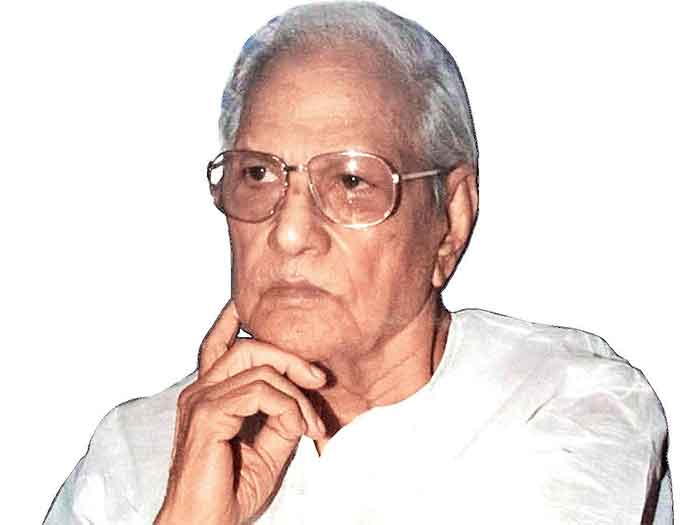
Majrooh Sultanpuri ( 1919-2000) was a highly talented lyricist of Hindi cinema who also received the highly coveted Dadasaheb Phalke Award for lifetime achievement. What is less known is his involvement in the Progressive Writers Movement and his strong leftist views as reflected in some of his earliest poems. In fact due to this he was imprisoned in 1949, just as he had got his first big break with hit films like Andaz and Arzoo. It was around the same time that Balraj Sahni too was arrested.
Coming out of the jail after about two years or so, it was not easy to get a second start as he also had to bear the stigma of a prison sentence. However his talent could not be suppressed for too long and he was soon back among hit songs with a very wide range. While he could pen very sad but at the same time popular songs in Shahjahan and Andaz, his light hearted romantic songs in films like Aar Paar, Mr. and Mrs. 55 and Nau Do Gyarah were roaring hits. However here we confine ourselves to just about ten or so songs from three films during the period 1962-66 when he appeared to be giving his best songs to the film industry.
Dosti ( 1964) was a landmark film from several points of view , one big highlight being its most memorable songs written by Majrooh Sahib, composed by Laxmikant Pyarelal and sung by Rafi Sahib, most of them filmed on a new and great actor Sudhir Kumar Sawant who played the role of a blind street singer. These philosophical songs tell of many deep thoughts in simple, melodious words.
Perhaps the best of these is the song Jaane Waalo Jara, Mur Ke Dekho Mujhe, Mai Bhi Insaan Hoon. At a more obvious level this is a street singer imploring passers-by to spare a look and thought for him too, as he too is a human being, but as the soulful song unfolds, this becomes a metaphor for a much wider, a very passionate plea to the entire world to care more for those who are distressed deeply– Tum mere paas aao, chodo ye sara bharam, jo mera dukh hai wahi hi tumhara bhi gam. Translation cannot do justice to this, but let me try—Give up all doubts and confusions and just remember this—what is one person’s distress is also the distress of the other one. The street singer says—I may be just a beggar to you, but remember I am the creation of the same mother earth, the same almighty. Further—We see each other, we know each other, but do we care for each other?
Another famous song from this film is—Chahunga Mai tujhe saanjh savere. This song brings out the eternal friendship of the two main characters of the film, both homeless and suffering from disabilities. Another song Meri dosti mera pyaar says that no matter how great our distress, as long as our friendship and companionship remain, we will not break. Then there is a song ‘ rahi manva dukh ki chinta’ which tries to find solace even in the saddest moments.
The second film for which Majrooh wrote immortal songs is Aarti. Here some great songs composed by Roshan have been filmed on Meena Kumari and Pradeep Kumar and sung by Rafi sahib and Lata Ji. One very memorable song is—Aap ne yaad dilaya to mujhe yaad aaya, ke mere dil me pada tha koi gam kaa saaya. Briefly this song says—I had been very sad for a long time but never uttered a word, bearing everything in silence, even becoming insensitive to my own suffering. It is only when I met you and felt for the first time that that someone is very sincerely sympathetic to me that I became sensitive to my welled up suffering and started feeling and talking about this, relieving myself of the great burden.
The other great song from this film is a song of great hope in difficult times—Kabhi to milegi, kahin to milegi baharon ki manzil rahi ( one day, somehow, somewhere, we will see times of happiness).
Last but not the least there are three great songs from Mamta (1966), filmed on Ashok Kumar and Suchitra Sen, sung by Rafi Sahib and Lata Ji, composed by Roshan. The first song is—Rahe Na Rahe Ham Mehka Karenge. Briefly this song says that we will always be flowers of this garden, and even after we are no more, we will find ways of meeting. The second song of immortal love from this film is—Chhupa lo dil mein pyar mera ke jaise mandir me lau diye ki—Keep my love in your heart with as much care as a temple protects the glow of an earthern lamp.
Apart from these two songs of immortal love, there is also a very disturbing song which becomes the eternal song of the wronged and the misunderstood woman, although it is to the great credit of Majrooh sahib that its words also meet the specific demands of the film’s story so aptly. This song is—rehte the kabhi jinke dil mein. The wronged, distressed women says–do not hurt me any more, I am already like a crimbling wall—Thokar na lagana hum khud hain, girti hui deewaron ki tarah.
Majrooh Sahib is also credited with one of the most quoted Urdu verses—main akela hi chala tha janiba manzil magar, log saath aate gaye aur caravan jurta gaya ( I had started out alone but many kept joining till we became a caravan).
Bharat Dogra has been involved with several social movements. His recent books include When the Two Streams Met, A Day in 2071 and Navjivan.











































